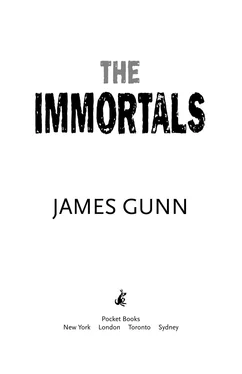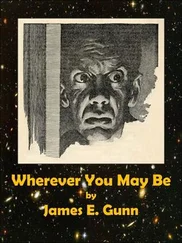When he was finished, Shoemaker was a fly caught in a web, transmitting feeble impulses to the spider lurking in the bag. This spider, though, was linked to the ambulance below by intangible lines, and together they would pour life back into the fly, not suck it away.
It took one minute and twenty-three seconds. During the next second, Flowers noticed the adhesive tape on the patient’s forearm. He frowned and tore it loose. Beneath was a compress dark with blood and a small, welling slit in the median-basilic vein.
“Who’s been here since this man fell ill?”
“Me,” the girl said clearly. One hand was resting gently on the box that held the lamp.
Beneath the head of the cot was a quart jar. In it was a pint of blood, clotting now but still warm. Flowers put it down slowly. “Why did you perform a phlebotomy on this man?”
“There was no other way to save his life,” she said gently.
“This isn’t the Dark Ages,” Flowers said. “You might have killed him.”
“Study your lessons better, Medic,” she told him softly. “In some cases bloodletting is effective when nothing else will work—in cerebral hemorrhage, for instance. It lowers the blood pressure temporarily and gives the blood in the ruptured vessel a chance to clot.”
Involuntarily Flowers glanced into the bag. From the bottom, the diagnosis fluoresced at him. It was cerebral hemorrhage, all right, and the prognosis was hopeful. The hemorrhage had stopped.
He took a compress out of a pocket in the bag, pulled the tab, and watched the wrapper disintegrate. He pressed it firmly over the cut. It clung to the skin as he took his hand away. “There are laws against practicing medicine without a license,” he said slowly. “I’ll have to report this.”
“Should I have let him die?”
“There are doctors to treat him.”
“He called one. It took you an hour and a half to get here. If I had waited, he’d have died.”
“I came as fast as I could. It’s no joke to find a place like this at night.”
“I’m not criticizing.” She put her hand back until she felt the chair behind her and sank down into it, lightly, gracefully, and folded her white hands in her lap. “You asked me why I bled him. I told you.”
Flowers was silent. The girl’s logic was impeccable, but she was wrong all the same. There weren’t any reasonable excuses for breaking the law. The practice of medicine had to be the monopoly of men who were carefully, exactingly trained for it and indoctrinated in the ancient ethics. No one else could be permitted to tamper with the most sacred thing in the world.
“You were lucky,” he said. “You might have guessed wrong.”
“There are no degrees to death.”
She rose and walked toward him confidently, put a hand on his shoulder, and leaned past him to touch Shoemaker’s forehead. “No,” she said, and her voice was firm with an odd certainty. “He’ll get well now. He’s a good man. We mustn’t let him die.”
The girl’s nearness was a warm fragrance, stirring, provocative. Flowers felt his blood pressure mount. Why not? he thought; she’s only an urban. But he couldn’t, and it wasn’t just a medic’s honor or even, perhaps, that she was blind.
He didn’t move, but she drew away, took back her hand, as if she sensed the emotions fermenting inside him.
“I’ve got to get him to the hospital,” Flowers said. “Besides the hemorrhage, there’ll be infection.”
“I scrubbed the arm with soap and then with alcohol,” she said. “I sterilized the knife in the lamp flame and scorched the bandage over the lamp chimney.”
Her fingers looked blistered. “You were lucky,” he said coldly. “Next time someone will die.”
She turned her face toward his voice. Flowers found the movement strangely appealing. “What can you do when they need you?”
It was too much like a physician’s response to the world’s plea for help. A doctor had the right to respond to the plea; she didn’t. He turned brusquely back to Shoemaker and began stripping away the instruments and stowing them in his bag. “I’ll have to carry him down to the ambulance. Can you carry the bag for me to light the way?”
“You mustn’t take him. He hasn’t kept up payments on his contract. You know what they’ll do.”
Flowers stopped in the act of snapping the bag shut. “If he’s a defaulter…” he began, his voice trembling on the verge of fury.
“What would you do,” she asked quietly, “if you were dying and alone? Wouldn’t you call for help? Any help? Would you stop to weigh legalities? He had a contract once, and the payments ruined him, cost him his home in the country, drove him here to the sustenance life. But when he was sick, he turned to his old faith, as a dying Catholic calls for his priest.”
Flowers recoiled from the comparison. “And he deprived several people of vital, lawful attention. The chances are he traded his life for that of someone else. That’s why the laws were passed. Those who pay for medical treatment shouldn’t be penalized by those who can’t—or won’t, which is usually the case. If Shoemaker can’t pay, he ought to be repossessed.” He stooped toward the old man.
She pulled him back with surprising strength and slipped between them, bent backward, one arm thrown back protectively toward Shoemaker. Her eyes were cloudy embers in the lamplight. “Surely you’ve got enough blood, enough organs. They’ll kill him.”
“There’s never enough,” Flowers said. “And there’s research, after that.” He put an impatient hand on her shoulder to push her aside. Under the dress material, the flesh felt warm and soft. “You must be an Antiviv.”
“I am, but that’s only part of it. I’m asking for him, because he’s worth saving. Are you so inflexible, so perfect, that you can’t—forget?”
He stopped pushing, looked down at his hand for a moment, and let it drop. He refused to fight with the girl for the man’s body.
“All right,” he said.
He picked up the black bag with a snap that locked it shut and started toward the door.
“Wait!” she said.
He looked back at her as she moved toward him blindly, her hand outstretched until her fingers touched the arm of his coat. “I want to thank you,” she said gently. “I thought there wasn’t any mercy left in the medical profession.”
For a moment his viscera felt cold, anesthetized, and then the icy feeling melted in a surge of anger. “Don’t misunderstand me,” he said brutally, shrugging her hand away. “I’m going to turn in his name to the Agency. I’m going to report you, too. That’s my duty.”
Her hand fell to her side in a gesture of apology, for her own mistake and perhaps also for humanity itself. “We do what we must.”
She moved forward past him, unbolted the door, and turned toward him, her back against the door. “I don’t think you’re as hard as you pretend to be.”
That stopped him. He wasn’t hard. He resented the implication that he was, that medics in general were incapable of understanding, were devoid of sympathy.
Those who must live in the midst of sickness and death, upon whose skill and judgment rest health and life and their concomitant, happiness, can’t be touched by the drama, the poignancy, the human values of every situation. It would be unendurable.
“There’s an old man downstairs who needs help,” she said hesitantly. “Would you see him?”
“Out of the question,” he answered sharply.
Her head lifted for a moment. That was pride, he thought. Then she nodded. “I’m sorry,” she said softly.
The light was dangerous, she said, and offered to lead him. Her hand was warm and firm and confident. Three-quarters of the way down there was a landing, where the stairs turned left. A door opened in the darkness to the right of the landing.
Читать дальше












